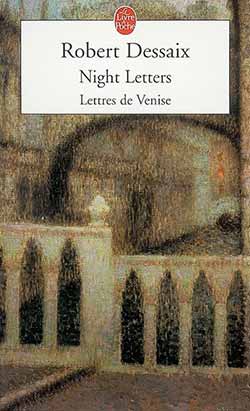 Night Letters
Night Letters
A Journey through Switzerland and Italy
by Robert Dessaix
Published by St. Martin’s Press (U.S. edition)
U.S. edition published November 1, 1997
First published 1996 by Arcadia Books, London
Fiction
275 pgs. • Find on Amazon.com • WorldCat
Reviewed by Stephen O. Murray
June 8, 2005.
Robert Dessaix’s Night Letters is a difficult book to characterize beyond noting that it is an epistolary novel.
The reader of the book does not know to whom the letters that are the book are addressed or the name of the sender. The letters are written from Venice, by a gay men who has a life partner in Melbourne, and who tested positive for an unnamed pathogen that is clearly HIV, though neither “HIV” nor “AIDS” occurs in the text.
Much of his personality and style are encapsulated in this reaction to the news:
Even if time is limited, you have to do something, you can’t sit at home just writing your memoirs and putting your affairs in order. In face, I refuse to put my affairs in order, to clean out the cupboard in the bedroom, get the side gate rehung, sort out my taxes and generally tidy up. It’s a temptation, but I refuse to start crafting a neat ending to my life, as if I were some minor short story. The more loose ends the better. (p. 105)
And although written from Venice, the book/letters are mostly recounting earlier stages of the European sojourn to which the author went after receiving a seeming death sentence (the book was published in 1996, so it was written just before protease inhibitors pulled many of us back from the edge of the abyss or the road to it). In addition to recalling the wait for test results back in Australia, the book tells the friend about what the man saw and (above all) heard in Locarno (in southern Switzerland), Vicenza, and Padua (both in northern Italy). In the first two of these, he was told very Arabian Nights-like tales about the history of a gold pin of (hetero)sexual coitus, and of a Venice courtesan who disappeared after much intrigue and relationships with a father and with his son.
A gay German professor the Australian had met in Locarno turns up in the same hotel in Venice, where his prowling does not lead to a disappearance but to some other unsettling results. I don’t know if the name of the professor, Eschenbaum, is an invocation of Aschenbach. Eschenbaum is not interested in boys and does not die of unrequited longings in Venice. The Australian makes some remarks on Mann’s Death in Venice but has more to say on Dante, whose Divine Comedy he is reading—out of order, starting with Purgatorio, then the Inferno, then Paradiso.
 He is also very interested in Casanova, the only prisoner ever to escape the dungeons under the Doge’s Palace, and in Marco Polo, whose lack of curiosity about what he saw in his travels considerably frustrates the author. And in Switzerland, he visits Patricia Highsmith (a visit he writes about with sympathy and wry wit).
He is also very interested in Casanova, the only prisoner ever to escape the dungeons under the Doge’s Palace, and in Marco Polo, whose lack of curiosity about what he saw in his travels considerably frustrates the author. And in Switzerland, he visits Patricia Highsmith (a visit he writes about with sympathy and wry wit).
The author is ready to recover from his travels (unlike Marco Polo or Aschenbach). Drifting through Europe for a time in some sense cleans his palate. He listens and looks around more than he apparently had in Australia and will continue to do back home. (Though from the flashbacks, he was not unobservant before fleeing to Europe for a while.)
There are plots in the stories of others (a surfeit of plot, indeed!), but other than recounting those stories, the letters are a mix of reverie and comments on writers, especially Dante (and, in addition to his extended contrast of Casanova and Marco Polo, Bruce Chatwin and Salman Rushdie). There is some travel writing genre material on the difficulties of finding shelter (without advance reservations) and expression of a strong distaste for Lake Como. Dessaix(’s narrator) is an entertaining travel chronicler who picks up some very elaborate tales of intrigues from earlier centuries.
There are notes on many of the allusions. They are often quite funny, pedantically accusing the author of the letters of fanciful reporting of historical fact and dubious literary interpretations. These are not as elaborate as Nabokov’s in Pale Fire, but add another unnamed character for the reader to infer from the annotations.
The chatty but lyrical voice of the letter-writer is very engaging. The book is not at all morbid, and reading it now, the reader knows that hope that he does not dare have is going to dawn soon after he returns to Australia (not yet sick).
The book was a best-seller in Australia, where Dessaix was(/is?) well-known gay television and radio bookchat figure. He has also written about Turgenev, which fits well with the sensibility of the nocturnal letter-writer. His Twilight of Love: Travels with Turgenev is going to be published next month in the U.S. A collection of essays on very diverse topics, And So Forth, is already available.
©08 June 2005, Stephen O. Murray

